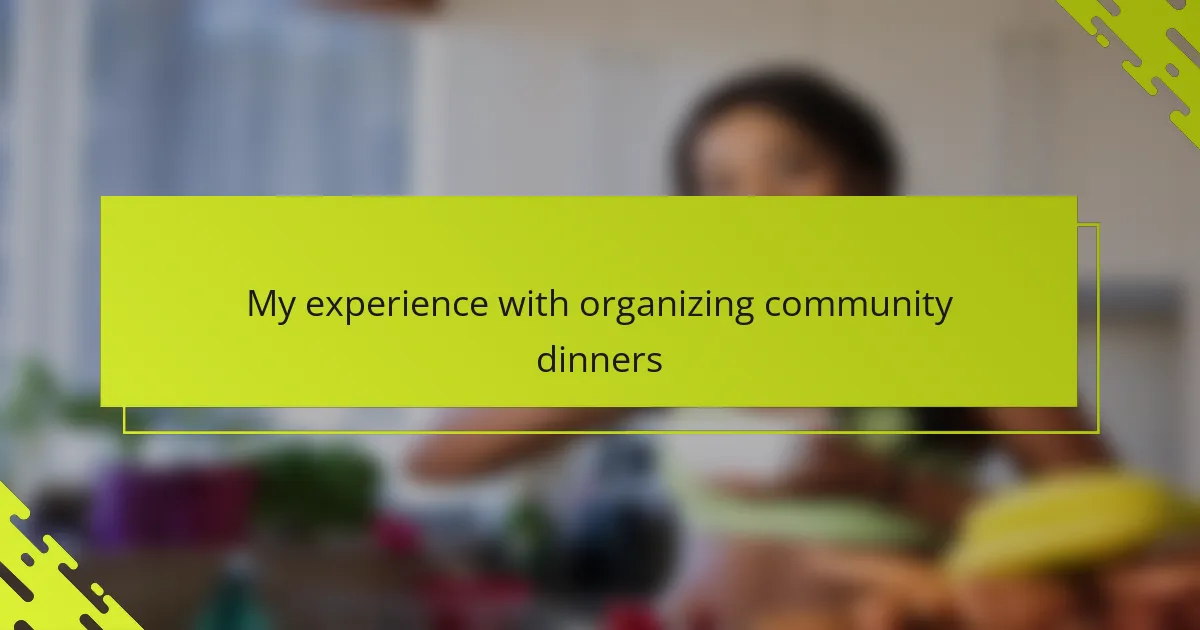Key takeaways
- Community dinners foster connection and belonging, encouraging genuine conversations and friendships.
- Inclusivity is essential; considering dietary needs and creating a welcoming atmosphere enhances participation.
- Flexibility in planning allows for adaptability, which can lead to unexpected joy and deeper community bonds.
- Intentional listening and patience are crucial for transforming gatherings into meaningful experiences.
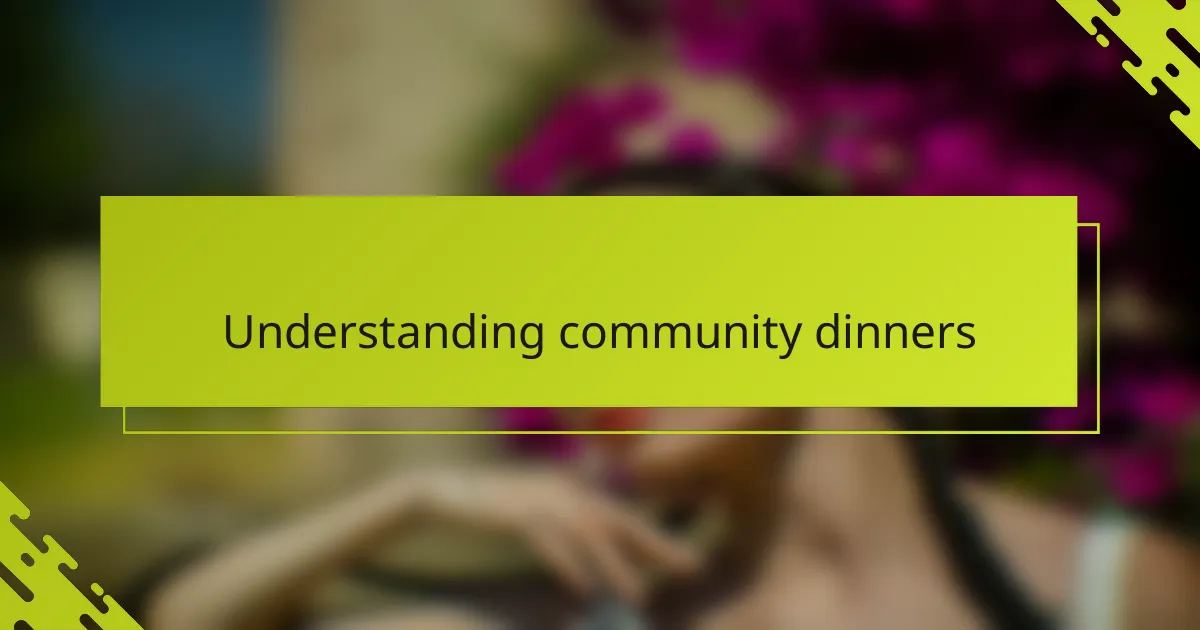
Understanding community dinners
Community dinners are more than just shared meals; they are spaces where connection unfolds naturally. I’ve found that when people gather around food, barriers dissolve, and conversations become more genuine. Isn’t it amazing how a simple meal can encourage people to open up and truly listen to one another?
From my experience, these dinners create a sense of belonging that’s hard to find elsewhere. There’s a special kind of warmth in knowing you’re part of something that values everyone’s presence, stories, and laughter. How often do we get to slow down, share food, and feel genuinely seen in today’s fast-paced world?
What strikes me most is how community dinners foster resilience and solidarity. They remind me that building supportive networks doesn’t require grand gestures—just a table, some food, and willing hearts. Have you ever noticed how those small moments around the dinner table can spark lifelong friendships?
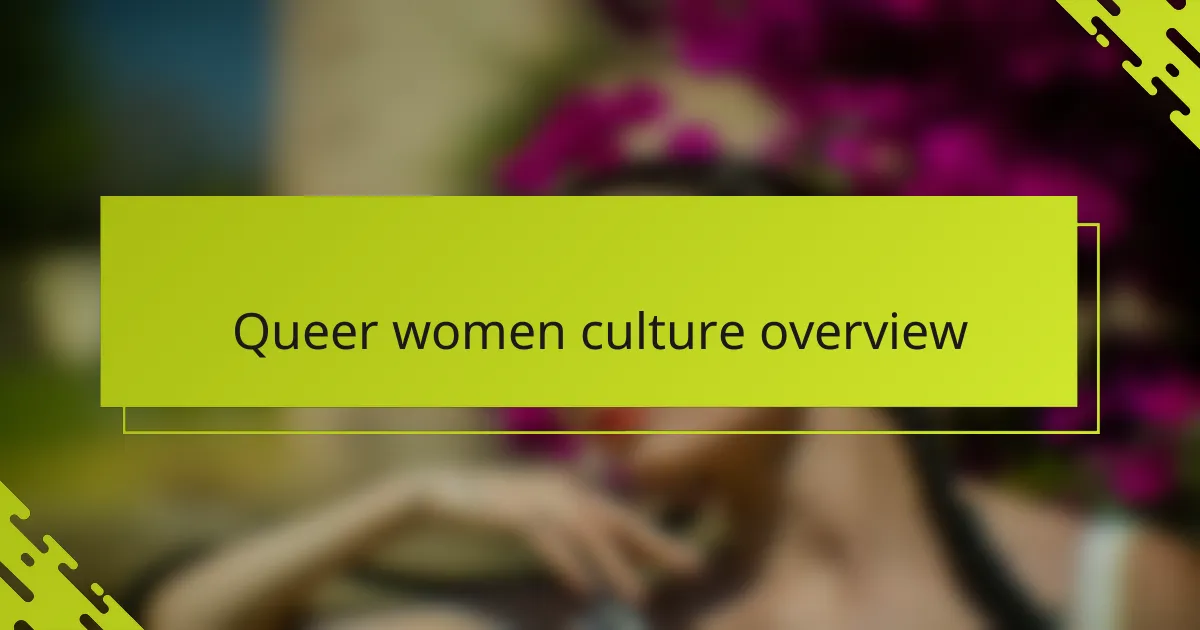
Queer women culture overview
Queer women culture, in my experience, is a vibrant tapestry woven from diverse stories, identities, and creative expressions. It’s a culture that embraces complexity and challenges norms, making space for authenticity and celebration. Have you ever noticed how this culture often feels like both a refuge and a rallying cry, inviting us to be seen and heard on our own terms?
What I find especially inspiring is how queer women communities prioritize connection and mutual support. It’s not just about shared identities; it’s about building relationships grounded in trust and care. I remember attending gatherings where laughter and vulnerability mingled freely, reflecting a culture that values emotional honesty.
At its core, queer women culture thrives on resilience and activism, often blending joy with the work of change. This balance feels deeply human to me—acknowledging the struggles while fiercely claiming space for joy and creativity. Doesn’t this duality make the culture feel so dynamic and alive?
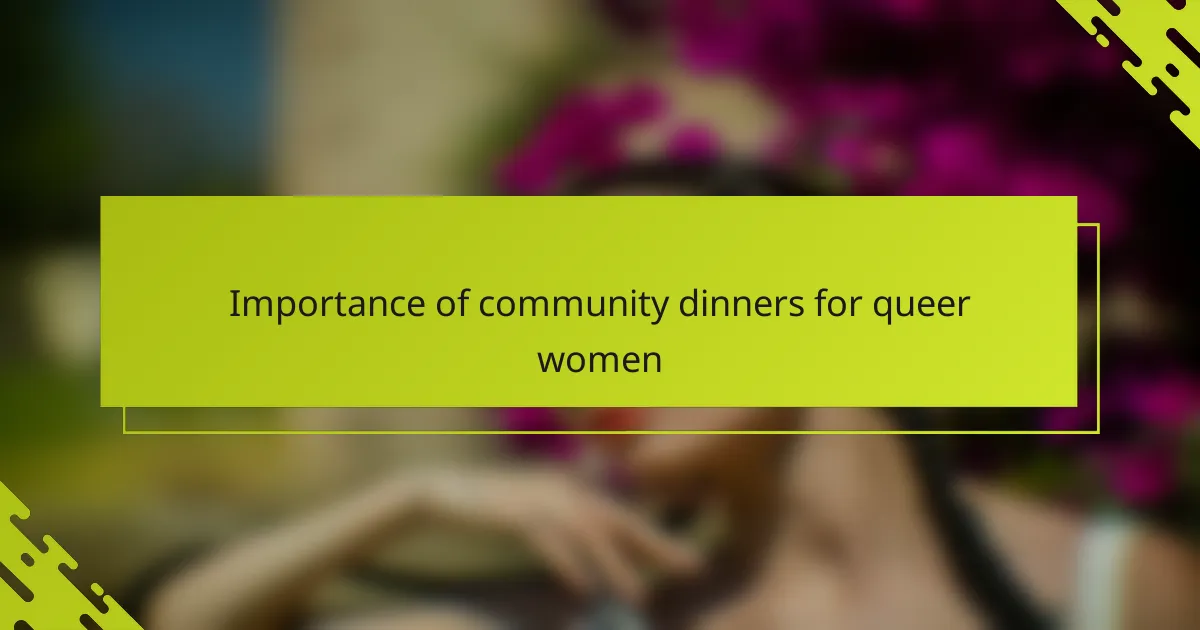
Importance of community dinners for queer women
Community dinners hold a unique place in queer women’s lives because they create intentional spaces where we can gather without the pressure to perform or conform. I’ve seen firsthand how these dinners become sanctuaries—moments where sharing a meal feels like sharing a part of ourselves. Have you ever noticed how these gatherings offer a rare chance to just be, fully and unapologetically?
What really stands out to me is how such dinners break down isolation. In my experience, queer women often navigate worlds that can feel fragmented or exclusionary, and coming together over food stitches those separate threads into a stronger fabric. There’s a comfort in knowing you’re surrounded by people who see your whole story, not just a label.
Plus, these dinners often spark unexpected support networks. I remember organizing one night where, after hours of sharing stories, new friendships formed that extended well beyond that meal. Isn’t it incredible how something as simple as community dinners can plant seeds for ongoing care and collective strength?
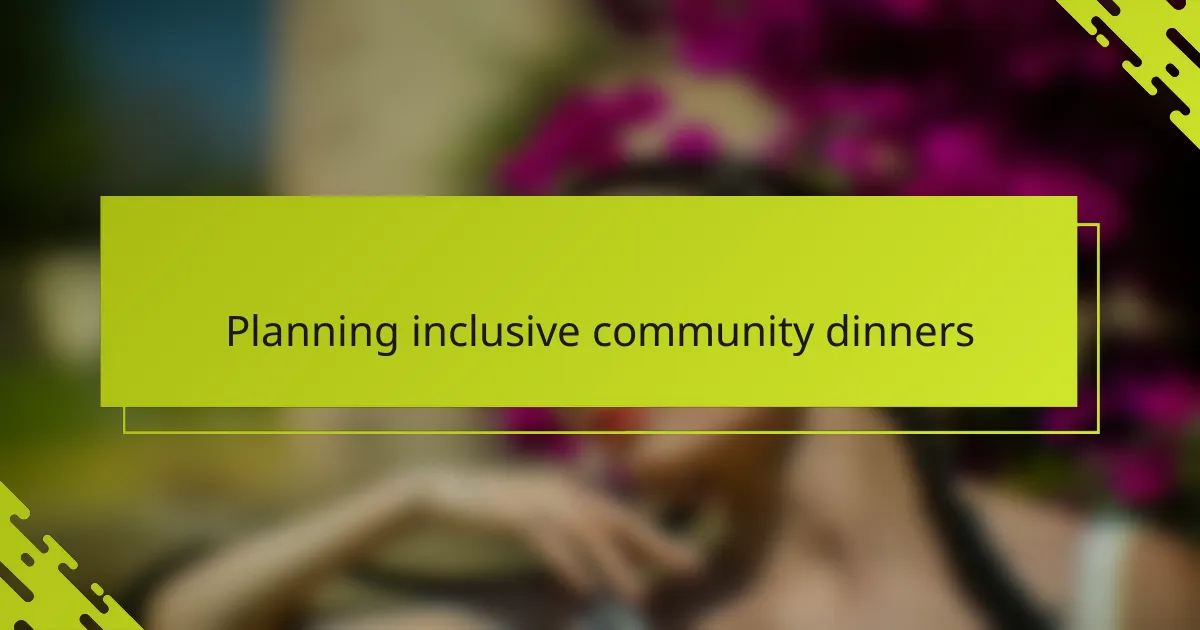
Planning inclusive community dinners
When I plan inclusive community dinners, I always start by thinking about who might feel welcomed—and who might not—because inclusion isn’t just about inviting everyone; it’s about making sure everyone feels safe and valued. One time, I intentionally asked attendees about dietary needs and pronouns beforehand, and it made such a difference seeing people relax, knowing their needs were respected. Have you ever noticed how those little details create an invisible bridge of trust before even arriving?
Creating space for diverse voices means more than just seating arrangements; I try to foster an atmosphere where people feel encouraged to share their stories without fear of judgment. Sometimes, I use small conversation prompts or create a sharing circle that gently nudges us all to listen deeply. When you see people opening up, does it remind you how powerful vulnerability is in building true community?
Logistics matter too—choosing accessible venues and timing that consider different schedules shows care in a practical way. Once, I held a dinner in a park with easy wheelchair access and flexible arrival times, and it was beautiful to see how that simple choice widened participation. Isn’t it rewarding when inclusion feels tangible, not just a buzzword?
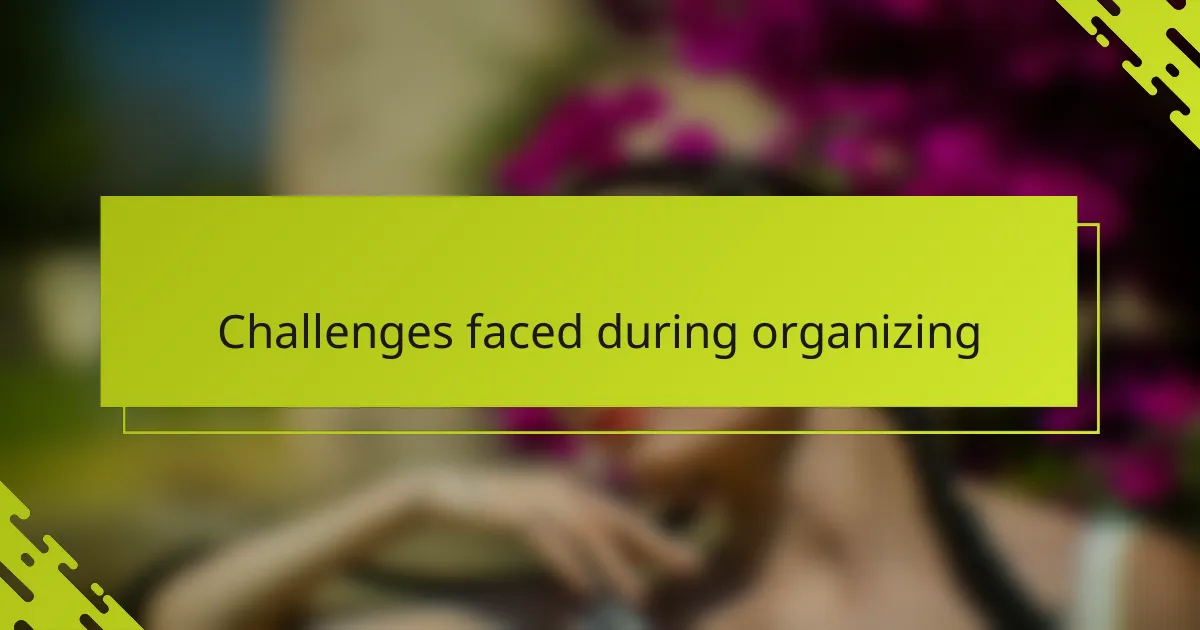
Challenges faced during organizing
One challenge I often face is balancing everyone’s dietary restrictions and preferences. I remember one dinner where I overlooked asking about allergies, and it caused stress right before the meal started—since then, I never skip that step. Have you ever seen how a simple act of thoughtful planning can turn tension into comfort?
Another hurdle is finding the right space that feels safe and accessible to all. Once, I booked a venue that wasn’t fully wheelchair accessible and it reminded me how crucial it is to consider mobility needs upfront. Doesn’t it make a big difference when everyone can come without worrying about physical barriers?
Lastly, managing expectations can be tricky. People bring different hopes for what the dinner will be, from deep conversations to light socializing. I’ve learned to embrace this diversity by creating flexible spaces, but it still requires constant attention. How do you strike that balance between structure and openness in community gatherings?
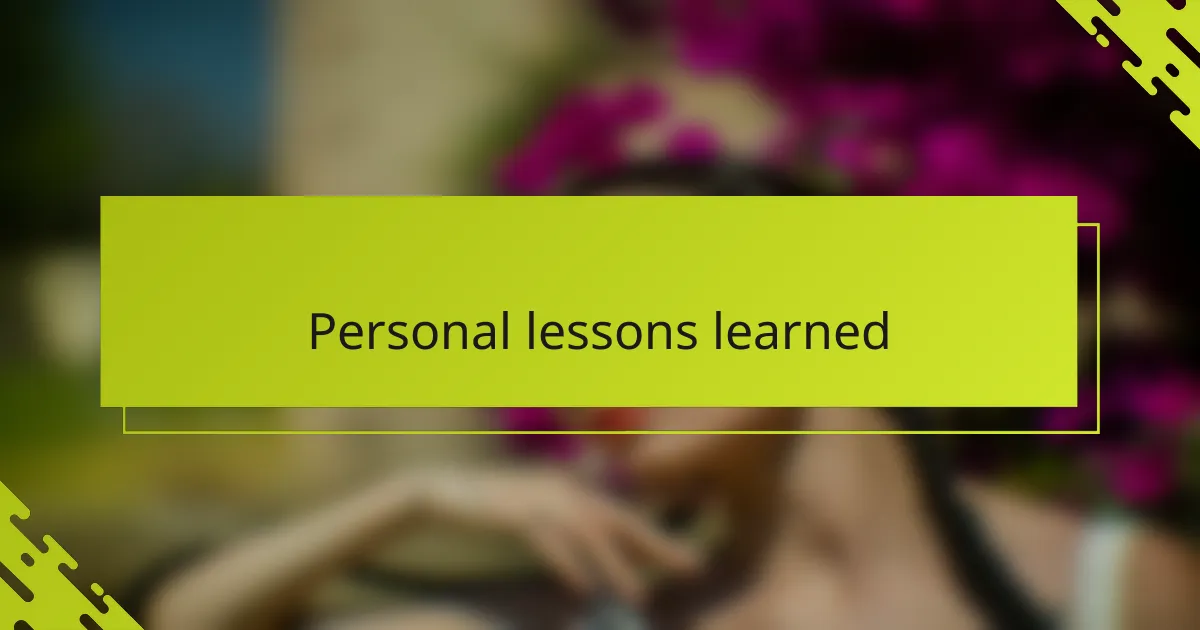
Personal lessons learned
One personal lesson that stuck with me is the power of intentional listening. Early on, I realized that organizing a dinner isn’t just about food or logistics—it’s about truly hearing the people around the table. When I created space for honest sharing, I saw how it transformed quiet moments into deep connections. Have you ever felt how much more meaningful a gathering becomes when everyone feels seen and heard?
Another insight emerged from juggling different needs and expectations. I used to think a successful dinner meant everyone having fun in the same way, but I quickly learned that’s unrealistic. Now, I plan with flexibility in mind, offering options for participation that honor individual comfort levels. Isn’t it freeing to accept that a community dinner can hold both lively laughs and gentle silences?
Finally, I’ve come to understand the importance of patience and humility. Not every dinner goes perfectly—sometimes plans fall through, emotions run high, or misunderstandings happen. Instead of getting discouraged, I remind myself that these moments are part of building something authentic. Have you noticed how embracing imperfection often invites deeper growth and resilience?
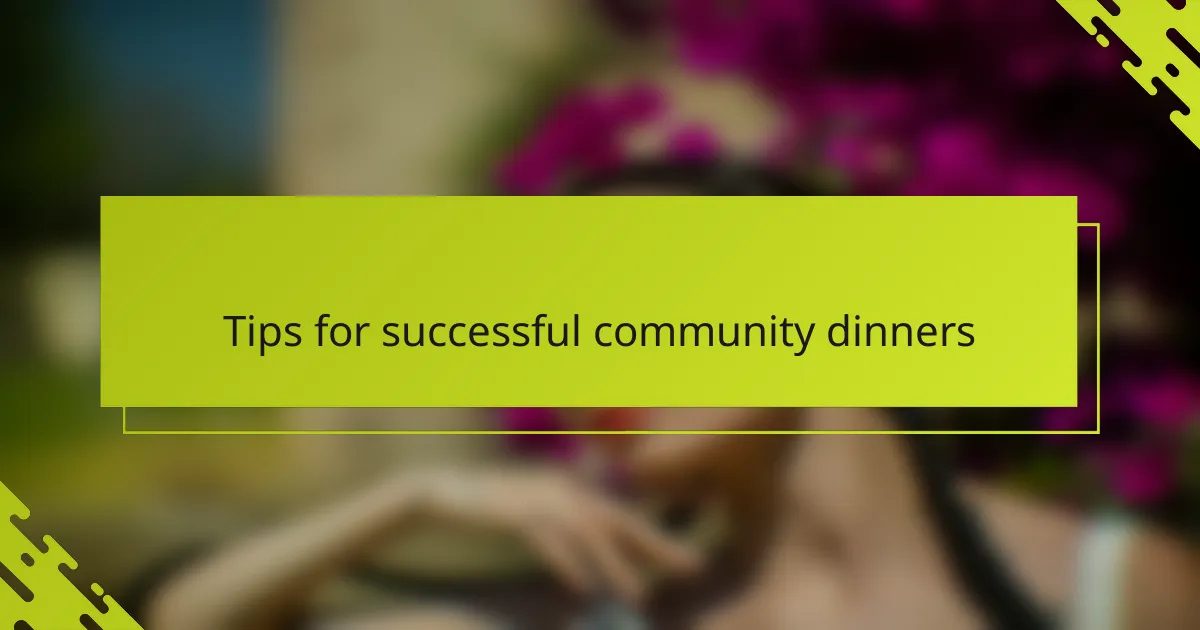
Tips for successful community dinners
One tip I swear by is setting clear, simple goals for the evening. When I started organizing community dinners, trying to do too much at once left everyone feeling overwhelmed—including me. Have you ever noticed how a relaxed atmosphere, without strict agendas, invites more natural connections?
Another practice that’s made a big difference is involving attendees in the planning. Once, I asked a few community members to help choose the menu and set up the space, and it felt like the dinner belonged to all of us—not just me. Doesn’t collaborating this way turn a dinner into a shared celebration rather than a one-person project?
Lastly, I’ve learned that flexibility is everything. There was one dinner where unexpected guests arrived and the food ran low, but instead of stressing, we adapted and leaned into improvisation. That night reminded me how openness to change creates space for joy and belonging. Have you experienced those moments when things don’t go as planned, yet the community spirit shines even brighter?
